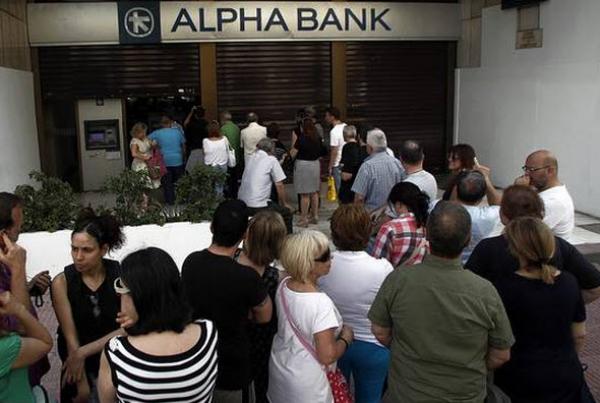Written by Greg Ellifritz
I’ve been watching with interest all the news reports of the ongoing financial collapse in Greece and can’t help but wonder when it will happen here in the USA. Most of you reading this article will be thinking something along the lines of “It can’t happen here.” I’ll remind you that the residents of Cyprus, Venezuela, Argentina, and Bosnia all thought the same thing. They were wrong too.
I don’t much care for talk about the politics and history of the debt crisis, so I’ll just take a look at the impact being felt by the average Greek citizen. If you have missed the news, Greece is almost in economic default. The country can’t pay its bills. Because of that, the government has instituted some controls on money in the country. Banks have been closed and citizens may not withdrawal more than the equivalent of around $65 per day from the ATMs. The restrictions have caused citizens to panic. ATM lines are hundreds of yards long. Many ATMs are empty and have no cash to dispense. Stores and gas stations have sold out of essential goods. Take a look at this article for a good summary of what’s going on.
You don’t want to be caught penniless and without supplies like the majority of Greek citizens if a similar collapse should happen here. It would be smart to have a few critical items that will keep you out of the ATM and supermarket lines if the worst situation happened here. You don’t have to go full “doomsday prepper” about all this. Just have some supplies on hand that will help you get through any emergency that you might be presented with. Here are the very basics that I think everything should have stored in their homes:
1) Cash. Cash is king in an emergency situation. Why would you need cash in a financial collapse when you can use credit or debit cards to pay for whatever you need? Because many stores stopped taking those forms of payment and only accept cash. I would suggest having enough cash hidden in your house to provide for a full month’s worth of food, water, and utility payments for your entire family. Hide the cash well in multiple, unconventional places.
2) Water. In a long term collapse, getting potable water should be a concern. To be best prepared, have at least five gallons of water per family member stored in your house. I use Aquatainers for my storage, but any food-grade plastic container should be fine.
In addition to stored water, you should also have the ability to gather water from rain or other natural sources. Make sure you have a few large buckets and/or a rain barrel catchment system for the gutters on your house.
You’ll want a water filter to purify this water as well. There are lots of excellent models on the market. I use the Life Straw Family filter as well as the Katadyn Hiker. If you are on a budget, water purification tablets or plain chlorine bleach can purify your gathered water supplies.
3) Food and a means to cook it. I think you should have at least two weeks worth of food supplies stockpiled for your family. I like the Mountain House brand backpacking foods, because they are tasty. have a 30 year shelf life and only require hot water to prepare. You don’t need to go to that route if costs are a concern. Put away some instant oatmeal, powdered milk, a 20 lb. bag of rice, and a bunch of canned tuna. Your meals won’t be delicious, but they will be adequate to keep you going and it will be cheap and easy to acquire the items on your next grocery shopping trip.
You’ll also need a means to cook if your power goes out. Many folks already have propane grill (with a side burner). That will work fine. Make sure you have an extra tank of propane. A small propane backpacking stove would be a cheap and useful acquisition as well.
4) Battery and electronic chargers. If the power goes out, you’ll want to be able to charge your cell phones, flashlights and small electronic items. I use a Solio solar charger for my phone and iPod. I’ve carried it all over the world. It’s durable and effective. I also have a solar charger for AA batteries to power lights in the house.
5) Medicine. Look again at what is happening in both Greece and Venezuela. People can’t get their prescription drugs from their local pharmacies. It’s prudent to have at least an extra month of any prescription or OTC drug you regularly use. Talk to your doctor about your concerns. He will likely give you an extra script as long as you aren’t asking for controlled drugs. Your insurance may not cover the extra, but it’s worth paying out of pocket for a little security. If your doc won’t write the script, come to my System Collapse medical class and I will teach you some alternate means to legally acquire prescription drugs.
It’s only a matter of time, folks. What is happening across the globe will eventually make it here. Spend a little money now to ensure that you aren’t caught short when it does.
* Some of the above links (from Amazon.com) are affiliate links. If you purchase these items, I get a small percentage of the selling price.


